HRM - From Brexit to Brexit plus COVID-19
VerifiedAdded on 2022/08/26
|12
|4073
|16
AI Summary
Contribute Materials
Your contribution can guide someone’s learning journey. Share your
documents today.
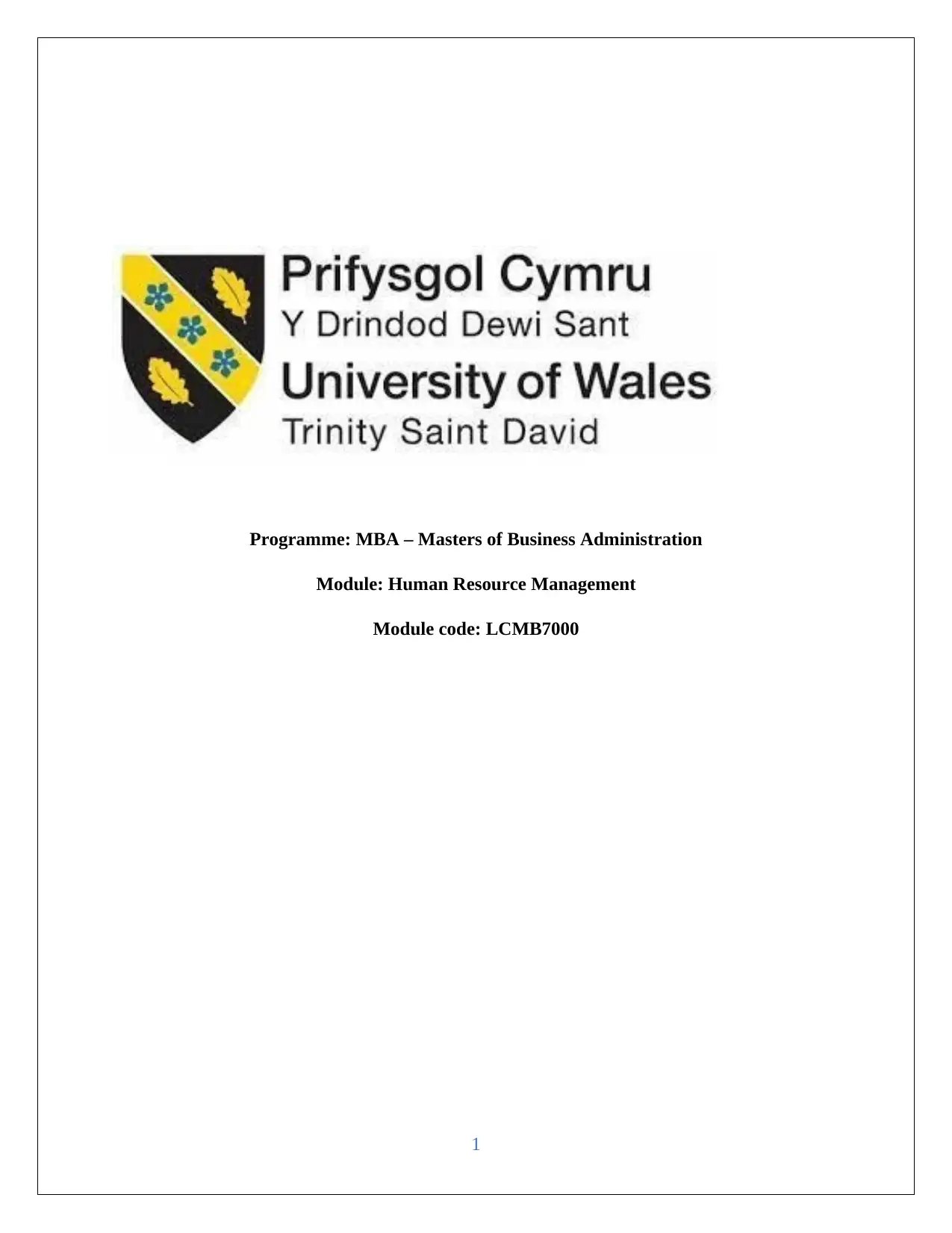
Programme: MBA – Masters of Business Administration
Module: Human Resource Management
Module code: LCMB7000
1
Module: Human Resource Management
Module code: LCMB7000
1
Secure Best Marks with AI Grader
Need help grading? Try our AI Grader for instant feedback on your assignments.
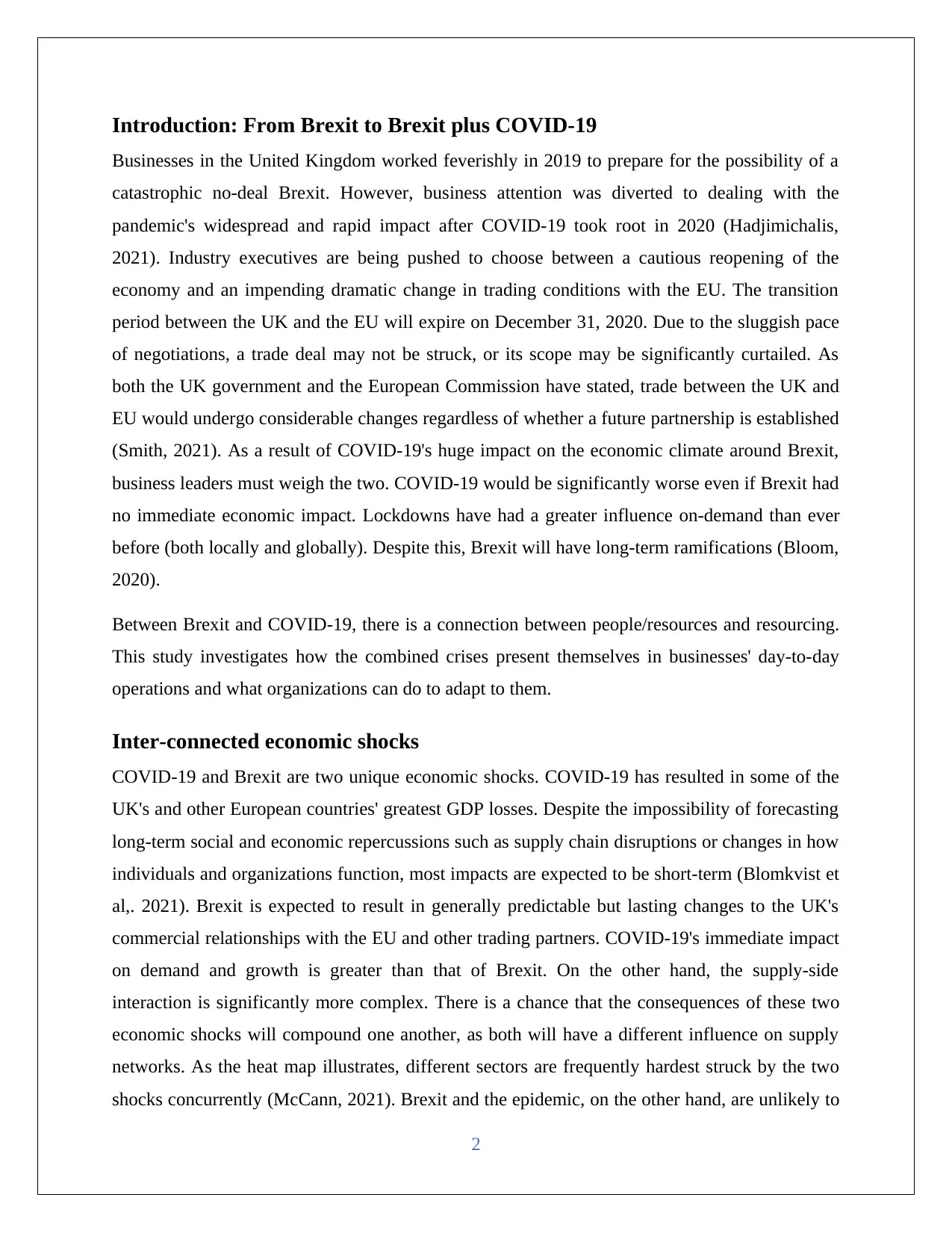
Introduction: From Brexit to Brexit plus COVID-19
Businesses in the United Kingdom worked feverishly in 2019 to prepare for the possibility of a
catastrophic no-deal Brexit. However, business attention was diverted to dealing with the
pandemic's widespread and rapid impact after COVID-19 took root in 2020 (Hadjimichalis,
2021). Industry executives are being pushed to choose between a cautious reopening of the
economy and an impending dramatic change in trading conditions with the EU. The transition
period between the UK and the EU will expire on December 31, 2020. Due to the sluggish pace
of negotiations, a trade deal may not be struck, or its scope may be significantly curtailed. As
both the UK government and the European Commission have stated, trade between the UK and
EU would undergo considerable changes regardless of whether a future partnership is established
(Smith, 2021). As a result of COVID-19's huge impact on the economic climate around Brexit,
business leaders must weigh the two. COVID-19 would be significantly worse even if Brexit had
no immediate economic impact. Lockdowns have had a greater influence on-demand than ever
before (both locally and globally). Despite this, Brexit will have long-term ramifications (Bloom,
2020).
Between Brexit and COVID-19, there is a connection between people/resources and resourcing.
This study investigates how the combined crises present themselves in businesses' day-to-day
operations and what organizations can do to adapt to them.
Inter-connected economic shocks
COVID-19 and Brexit are two unique economic shocks. COVID-19 has resulted in some of the
UK's and other European countries' greatest GDP losses. Despite the impossibility of forecasting
long-term social and economic repercussions such as supply chain disruptions or changes in how
individuals and organizations function, most impacts are expected to be short-term (Blomkvist et
al,. 2021). Brexit is expected to result in generally predictable but lasting changes to the UK's
commercial relationships with the EU and other trading partners. COVID-19's immediate impact
on demand and growth is greater than that of Brexit. On the other hand, the supply-side
interaction is significantly more complex. There is a chance that the consequences of these two
economic shocks will compound one another, as both will have a different influence on supply
networks. As the heat map illustrates, different sectors are frequently hardest struck by the two
shocks concurrently (McCann, 2021). Brexit and the epidemic, on the other hand, are unlikely to
2
Businesses in the United Kingdom worked feverishly in 2019 to prepare for the possibility of a
catastrophic no-deal Brexit. However, business attention was diverted to dealing with the
pandemic's widespread and rapid impact after COVID-19 took root in 2020 (Hadjimichalis,
2021). Industry executives are being pushed to choose between a cautious reopening of the
economy and an impending dramatic change in trading conditions with the EU. The transition
period between the UK and the EU will expire on December 31, 2020. Due to the sluggish pace
of negotiations, a trade deal may not be struck, or its scope may be significantly curtailed. As
both the UK government and the European Commission have stated, trade between the UK and
EU would undergo considerable changes regardless of whether a future partnership is established
(Smith, 2021). As a result of COVID-19's huge impact on the economic climate around Brexit,
business leaders must weigh the two. COVID-19 would be significantly worse even if Brexit had
no immediate economic impact. Lockdowns have had a greater influence on-demand than ever
before (both locally and globally). Despite this, Brexit will have long-term ramifications (Bloom,
2020).
Between Brexit and COVID-19, there is a connection between people/resources and resourcing.
This study investigates how the combined crises present themselves in businesses' day-to-day
operations and what organizations can do to adapt to them.
Inter-connected economic shocks
COVID-19 and Brexit are two unique economic shocks. COVID-19 has resulted in some of the
UK's and other European countries' greatest GDP losses. Despite the impossibility of forecasting
long-term social and economic repercussions such as supply chain disruptions or changes in how
individuals and organizations function, most impacts are expected to be short-term (Blomkvist et
al,. 2021). Brexit is expected to result in generally predictable but lasting changes to the UK's
commercial relationships with the EU and other trading partners. COVID-19's immediate impact
on demand and growth is greater than that of Brexit. On the other hand, the supply-side
interaction is significantly more complex. There is a chance that the consequences of these two
economic shocks will compound one another, as both will have a different influence on supply
networks. As the heat map illustrates, different sectors are frequently hardest struck by the two
shocks concurrently (McCann, 2021). Brexit and the epidemic, on the other hand, are unlikely to
2
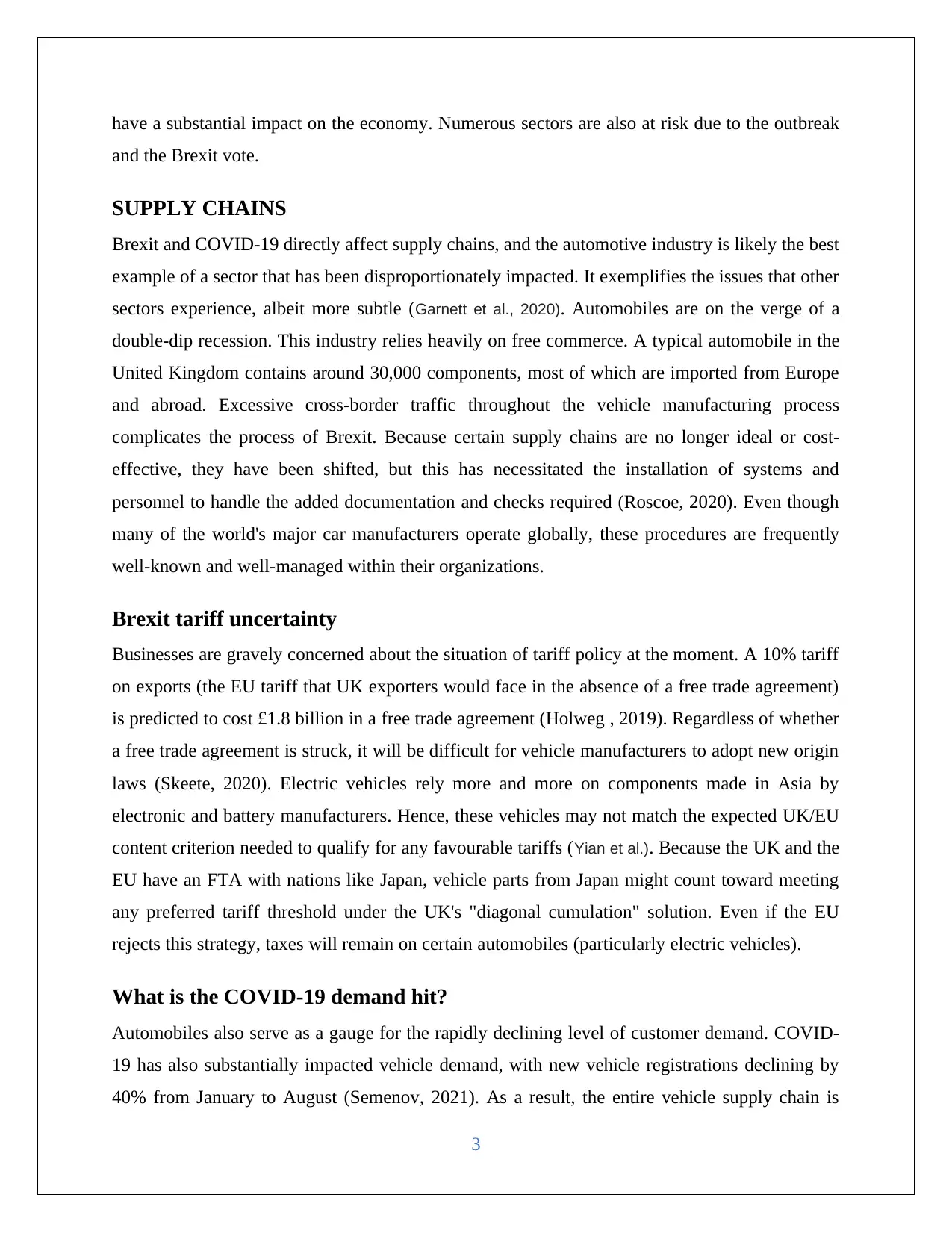
have a substantial impact on the economy. Numerous sectors are also at risk due to the outbreak
and the Brexit vote.
SUPPLY CHAINS
Brexit and COVID-19 directly affect supply chains, and the automotive industry is likely the best
example of a sector that has been disproportionately impacted. It exemplifies the issues that other
sectors experience, albeit more subtle (Garnett et al., 2020). Automobiles are on the verge of a
double-dip recession. This industry relies heavily on free commerce. A typical automobile in the
United Kingdom contains around 30,000 components, most of which are imported from Europe
and abroad. Excessive cross-border traffic throughout the vehicle manufacturing process
complicates the process of Brexit. Because certain supply chains are no longer ideal or cost-
effective, they have been shifted, but this has necessitated the installation of systems and
personnel to handle the added documentation and checks required (Roscoe, 2020). Even though
many of the world's major car manufacturers operate globally, these procedures are frequently
well-known and well-managed within their organizations.
Brexit tariff uncertainty
Businesses are gravely concerned about the situation of tariff policy at the moment. A 10% tariff
on exports (the EU tariff that UK exporters would face in the absence of a free trade agreement)
is predicted to cost £1.8 billion in a free trade agreement (Holweg , 2019). Regardless of whether
a free trade agreement is struck, it will be difficult for vehicle manufacturers to adopt new origin
laws (Skeete, 2020). Electric vehicles rely more and more on components made in Asia by
electronic and battery manufacturers. Hence, these vehicles may not match the expected UK/EU
content criterion needed to qualify for any favourable tariffs (Yian et al.). Because the UK and the
EU have an FTA with nations like Japan, vehicle parts from Japan might count toward meeting
any preferred tariff threshold under the UK's "diagonal cumulation" solution. Even if the EU
rejects this strategy, taxes will remain on certain automobiles (particularly electric vehicles).
What is the COVID-19 demand hit?
Automobiles also serve as a gauge for the rapidly declining level of customer demand. COVID-
19 has also substantially impacted vehicle demand, with new vehicle registrations declining by
40% from January to August (Semenov, 2021). As a result, the entire vehicle supply chain is
3
and the Brexit vote.
SUPPLY CHAINS
Brexit and COVID-19 directly affect supply chains, and the automotive industry is likely the best
example of a sector that has been disproportionately impacted. It exemplifies the issues that other
sectors experience, albeit more subtle (Garnett et al., 2020). Automobiles are on the verge of a
double-dip recession. This industry relies heavily on free commerce. A typical automobile in the
United Kingdom contains around 30,000 components, most of which are imported from Europe
and abroad. Excessive cross-border traffic throughout the vehicle manufacturing process
complicates the process of Brexit. Because certain supply chains are no longer ideal or cost-
effective, they have been shifted, but this has necessitated the installation of systems and
personnel to handle the added documentation and checks required (Roscoe, 2020). Even though
many of the world's major car manufacturers operate globally, these procedures are frequently
well-known and well-managed within their organizations.
Brexit tariff uncertainty
Businesses are gravely concerned about the situation of tariff policy at the moment. A 10% tariff
on exports (the EU tariff that UK exporters would face in the absence of a free trade agreement)
is predicted to cost £1.8 billion in a free trade agreement (Holweg , 2019). Regardless of whether
a free trade agreement is struck, it will be difficult for vehicle manufacturers to adopt new origin
laws (Skeete, 2020). Electric vehicles rely more and more on components made in Asia by
electronic and battery manufacturers. Hence, these vehicles may not match the expected UK/EU
content criterion needed to qualify for any favourable tariffs (Yian et al.). Because the UK and the
EU have an FTA with nations like Japan, vehicle parts from Japan might count toward meeting
any preferred tariff threshold under the UK's "diagonal cumulation" solution. Even if the EU
rejects this strategy, taxes will remain on certain automobiles (particularly electric vehicles).
What is the COVID-19 demand hit?
Automobiles also serve as a gauge for the rapidly declining level of customer demand. COVID-
19 has also substantially impacted vehicle demand, with new vehicle registrations declining by
40% from January to August (Semenov, 2021). As a result, the entire vehicle supply chain is
3
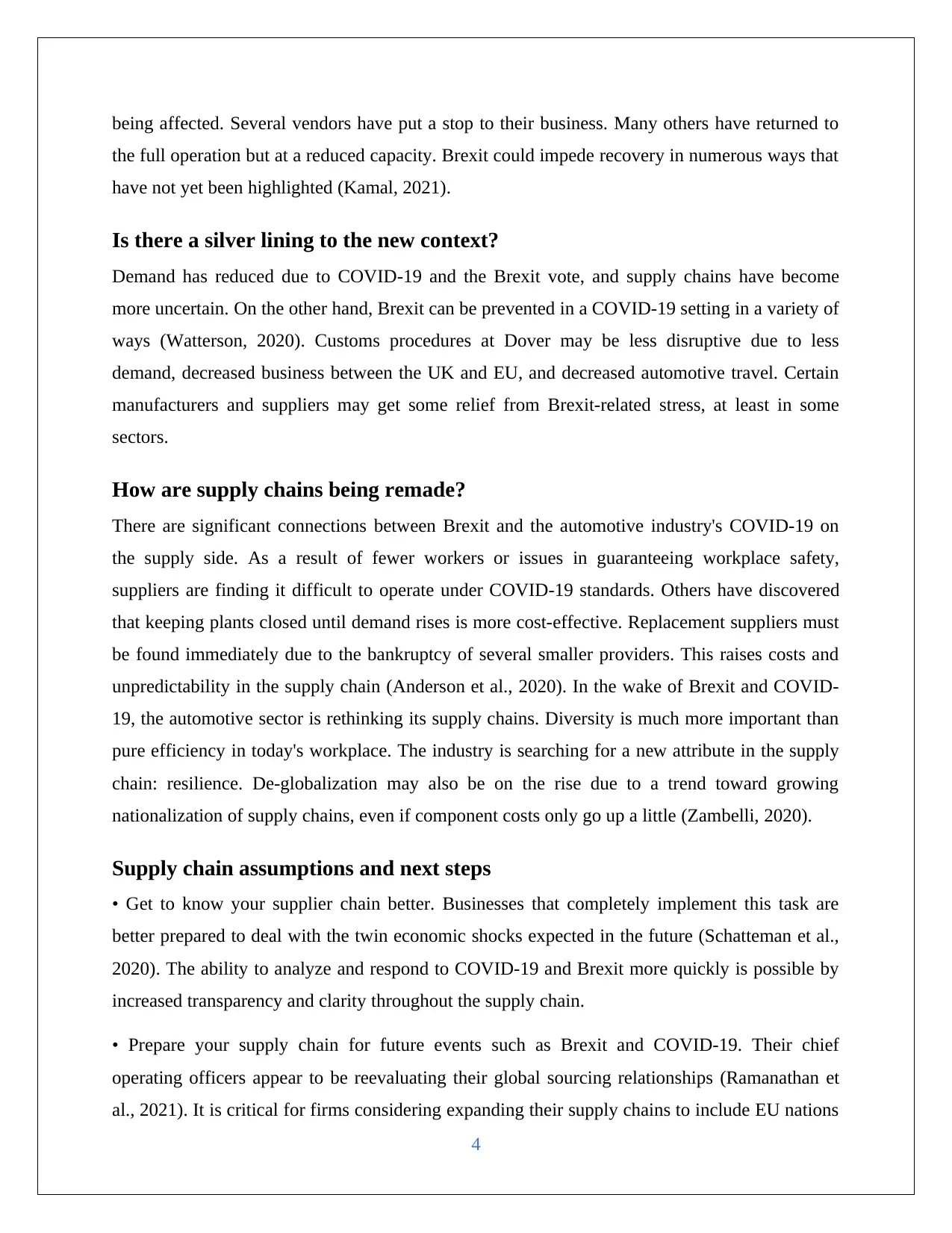
being affected. Several vendors have put a stop to their business. Many others have returned to
the full operation but at a reduced capacity. Brexit could impede recovery in numerous ways that
have not yet been highlighted (Kamal, 2021).
Is there a silver lining to the new context?
Demand has reduced due to COVID-19 and the Brexit vote, and supply chains have become
more uncertain. On the other hand, Brexit can be prevented in a COVID-19 setting in a variety of
ways (Watterson, 2020). Customs procedures at Dover may be less disruptive due to less
demand, decreased business between the UK and EU, and decreased automotive travel. Certain
manufacturers and suppliers may get some relief from Brexit-related stress, at least in some
sectors.
How are supply chains being remade?
There are significant connections between Brexit and the automotive industry's COVID-19 on
the supply side. As a result of fewer workers or issues in guaranteeing workplace safety,
suppliers are finding it difficult to operate under COVID-19 standards. Others have discovered
that keeping plants closed until demand rises is more cost-effective. Replacement suppliers must
be found immediately due to the bankruptcy of several smaller providers. This raises costs and
unpredictability in the supply chain (Anderson et al., 2020). In the wake of Brexit and COVID-
19, the automotive sector is rethinking its supply chains. Diversity is much more important than
pure efficiency in today's workplace. The industry is searching for a new attribute in the supply
chain: resilience. De-globalization may also be on the rise due to a trend toward growing
nationalization of supply chains, even if component costs only go up a little (Zambelli, 2020).
Supply chain assumptions and next steps
• Get to know your supplier chain better. Businesses that completely implement this task are
better prepared to deal with the twin economic shocks expected in the future (Schatteman et al.,
2020). The ability to analyze and respond to COVID-19 and Brexit more quickly is possible by
increased transparency and clarity throughout the supply chain.
• Prepare your supply chain for future events such as Brexit and COVID-19. Their chief
operating officers appear to be reevaluating their global sourcing relationships (Ramanathan et
al., 2021). It is critical for firms considering expanding their supply chains to include EU nations
4
the full operation but at a reduced capacity. Brexit could impede recovery in numerous ways that
have not yet been highlighted (Kamal, 2021).
Is there a silver lining to the new context?
Demand has reduced due to COVID-19 and the Brexit vote, and supply chains have become
more uncertain. On the other hand, Brexit can be prevented in a COVID-19 setting in a variety of
ways (Watterson, 2020). Customs procedures at Dover may be less disruptive due to less
demand, decreased business between the UK and EU, and decreased automotive travel. Certain
manufacturers and suppliers may get some relief from Brexit-related stress, at least in some
sectors.
How are supply chains being remade?
There are significant connections between Brexit and the automotive industry's COVID-19 on
the supply side. As a result of fewer workers or issues in guaranteeing workplace safety,
suppliers are finding it difficult to operate under COVID-19 standards. Others have discovered
that keeping plants closed until demand rises is more cost-effective. Replacement suppliers must
be found immediately due to the bankruptcy of several smaller providers. This raises costs and
unpredictability in the supply chain (Anderson et al., 2020). In the wake of Brexit and COVID-
19, the automotive sector is rethinking its supply chains. Diversity is much more important than
pure efficiency in today's workplace. The industry is searching for a new attribute in the supply
chain: resilience. De-globalization may also be on the rise due to a trend toward growing
nationalization of supply chains, even if component costs only go up a little (Zambelli, 2020).
Supply chain assumptions and next steps
• Get to know your supplier chain better. Businesses that completely implement this task are
better prepared to deal with the twin economic shocks expected in the future (Schatteman et al.,
2020). The ability to analyze and respond to COVID-19 and Brexit more quickly is possible by
increased transparency and clarity throughout the supply chain.
• Prepare your supply chain for future events such as Brexit and COVID-19. Their chief
operating officers appear to be reevaluating their global sourcing relationships (Ramanathan et
al., 2021). It is critical for firms considering expanding their supply chains to include EU nations
4
Secure Best Marks with AI Grader
Need help grading? Try our AI Grader for instant feedback on your assignments.
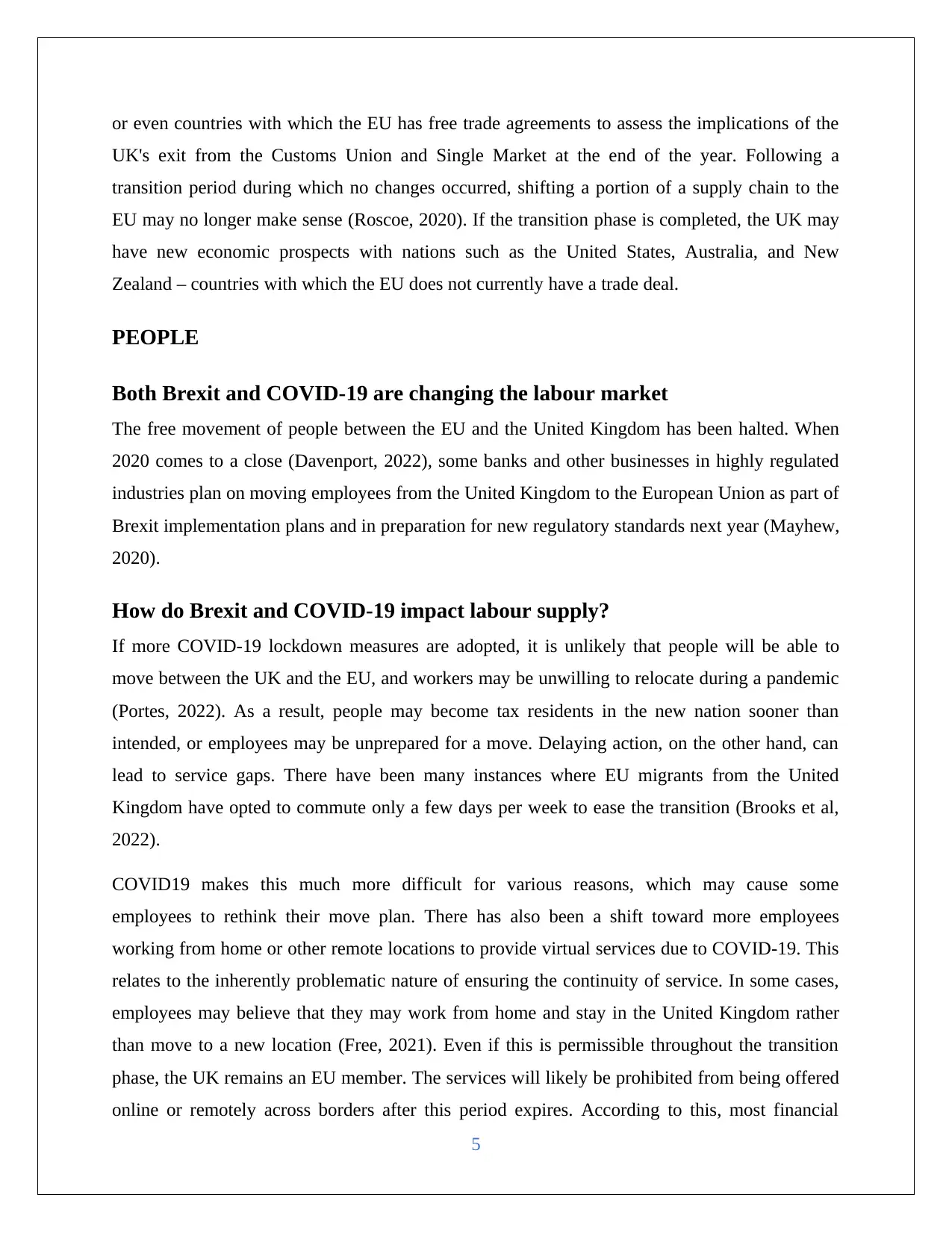
or even countries with which the EU has free trade agreements to assess the implications of the
UK's exit from the Customs Union and Single Market at the end of the year. Following a
transition period during which no changes occurred, shifting a portion of a supply chain to the
EU may no longer make sense (Roscoe, 2020). If the transition phase is completed, the UK may
have new economic prospects with nations such as the United States, Australia, and New
Zealand – countries with which the EU does not currently have a trade deal.
PEOPLE
Both Brexit and COVID-19 are changing the labour market
The free movement of people between the EU and the United Kingdom has been halted. When
2020 comes to a close (Davenport, 2022), some banks and other businesses in highly regulated
industries plan on moving employees from the United Kingdom to the European Union as part of
Brexit implementation plans and in preparation for new regulatory standards next year (Mayhew,
2020).
How do Brexit and COVID-19 impact labour supply?
If more COVID-19 lockdown measures are adopted, it is unlikely that people will be able to
move between the UK and the EU, and workers may be unwilling to relocate during a pandemic
(Portes, 2022). As a result, people may become tax residents in the new nation sooner than
intended, or employees may be unprepared for a move. Delaying action, on the other hand, can
lead to service gaps. There have been many instances where EU migrants from the United
Kingdom have opted to commute only a few days per week to ease the transition (Brooks et al,
2022).
COVID19 makes this much more difficult for various reasons, which may cause some
employees to rethink their move plan. There has also been a shift toward more employees
working from home or other remote locations to provide virtual services due to COVID-19. This
relates to the inherently problematic nature of ensuring the continuity of service. In some cases,
employees may believe that they may work from home and stay in the United Kingdom rather
than move to a new location (Free, 2021). Even if this is permissible throughout the transition
phase, the UK remains an EU member. The services will likely be prohibited from being offered
online or remotely across borders after this period expires. According to this, most financial
5
UK's exit from the Customs Union and Single Market at the end of the year. Following a
transition period during which no changes occurred, shifting a portion of a supply chain to the
EU may no longer make sense (Roscoe, 2020). If the transition phase is completed, the UK may
have new economic prospects with nations such as the United States, Australia, and New
Zealand – countries with which the EU does not currently have a trade deal.
PEOPLE
Both Brexit and COVID-19 are changing the labour market
The free movement of people between the EU and the United Kingdom has been halted. When
2020 comes to a close (Davenport, 2022), some banks and other businesses in highly regulated
industries plan on moving employees from the United Kingdom to the European Union as part of
Brexit implementation plans and in preparation for new regulatory standards next year (Mayhew,
2020).
How do Brexit and COVID-19 impact labour supply?
If more COVID-19 lockdown measures are adopted, it is unlikely that people will be able to
move between the UK and the EU, and workers may be unwilling to relocate during a pandemic
(Portes, 2022). As a result, people may become tax residents in the new nation sooner than
intended, or employees may be unprepared for a move. Delaying action, on the other hand, can
lead to service gaps. There have been many instances where EU migrants from the United
Kingdom have opted to commute only a few days per week to ease the transition (Brooks et al,
2022).
COVID19 makes this much more difficult for various reasons, which may cause some
employees to rethink their move plan. There has also been a shift toward more employees
working from home or other remote locations to provide virtual services due to COVID-19. This
relates to the inherently problematic nature of ensuring the continuity of service. In some cases,
employees may believe that they may work from home and stay in the United Kingdom rather
than move to a new location (Free, 2021). Even if this is permissible throughout the transition
phase, the UK remains an EU member. The services will likely be prohibited from being offered
online or remotely across borders after this period expires. According to this, most financial
5
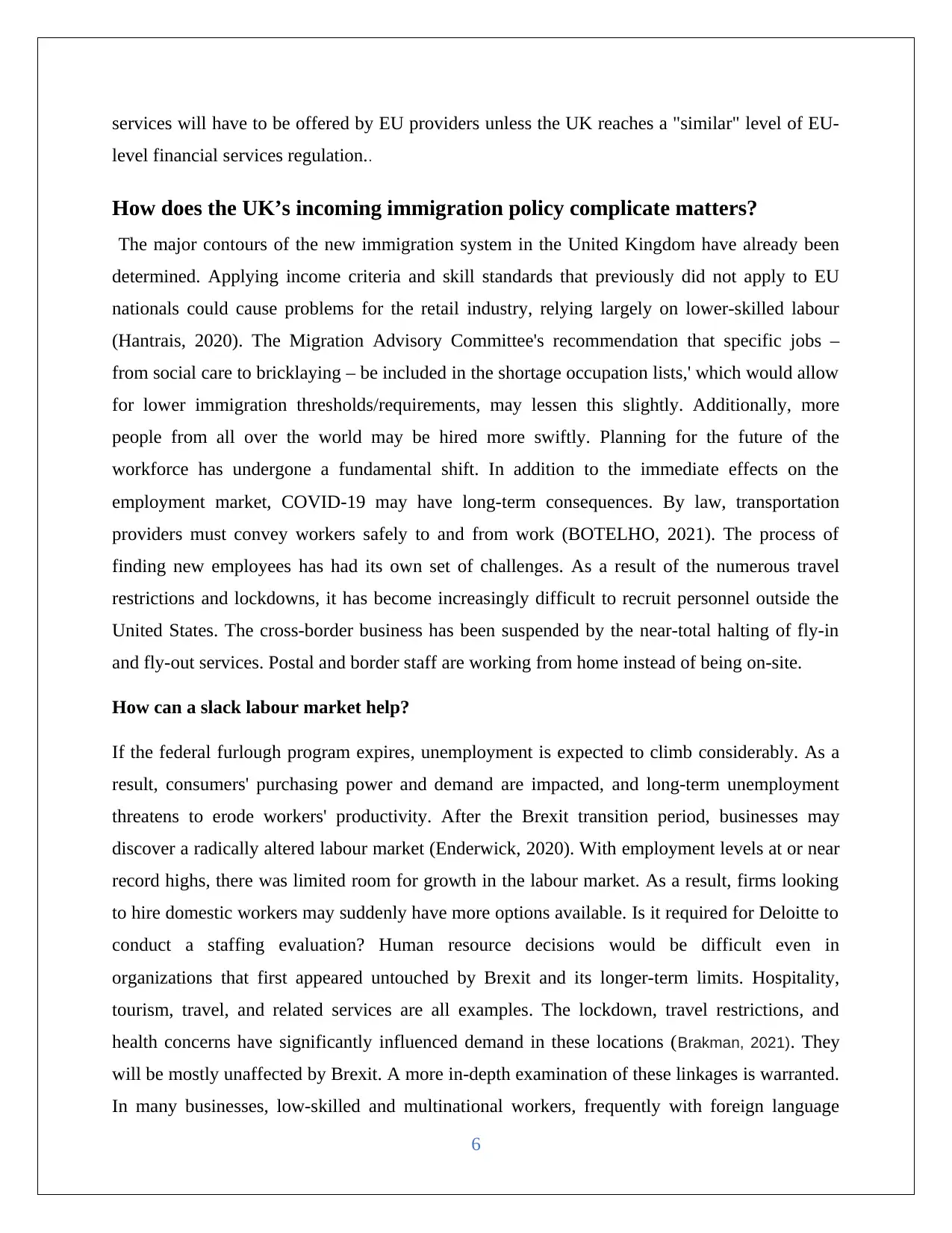
services will have to be offered by EU providers unless the UK reaches a "similar" level of EU-
level financial services regulation..
How does the UK’s incoming immigration policy complicate matters?
The major contours of the new immigration system in the United Kingdom have already been
determined. Applying income criteria and skill standards that previously did not apply to EU
nationals could cause problems for the retail industry, relying largely on lower-skilled labour
(Hantrais, 2020). The Migration Advisory Committee's recommendation that specific jobs –
from social care to bricklaying – be included in the shortage occupation lists,' which would allow
for lower immigration thresholds/requirements, may lessen this slightly. Additionally, more
people from all over the world may be hired more swiftly. Planning for the future of the
workforce has undergone a fundamental shift. In addition to the immediate effects on the
employment market, COVID-19 may have long-term consequences. By law, transportation
providers must convey workers safely to and from work (BOTELHO, 2021). The process of
finding new employees has had its own set of challenges. As a result of the numerous travel
restrictions and lockdowns, it has become increasingly difficult to recruit personnel outside the
United States. The cross-border business has been suspended by the near-total halting of fly-in
and fly-out services. Postal and border staff are working from home instead of being on-site.
How can a slack labour market help?
If the federal furlough program expires, unemployment is expected to climb considerably. As a
result, consumers' purchasing power and demand are impacted, and long-term unemployment
threatens to erode workers' productivity. After the Brexit transition period, businesses may
discover a radically altered labour market (Enderwick, 2020). With employment levels at or near
record highs, there was limited room for growth in the labour market. As a result, firms looking
to hire domestic workers may suddenly have more options available. Is it required for Deloitte to
conduct a staffing evaluation? Human resource decisions would be difficult even in
organizations that first appeared untouched by Brexit and its longer-term limits. Hospitality,
tourism, travel, and related services are all examples. The lockdown, travel restrictions, and
health concerns have significantly influenced demand in these locations (Brakman, 2021). They
will be mostly unaffected by Brexit. A more in-depth examination of these linkages is warranted.
In many businesses, low-skilled and multinational workers, frequently with foreign language
6
level financial services regulation..
How does the UK’s incoming immigration policy complicate matters?
The major contours of the new immigration system in the United Kingdom have already been
determined. Applying income criteria and skill standards that previously did not apply to EU
nationals could cause problems for the retail industry, relying largely on lower-skilled labour
(Hantrais, 2020). The Migration Advisory Committee's recommendation that specific jobs –
from social care to bricklaying – be included in the shortage occupation lists,' which would allow
for lower immigration thresholds/requirements, may lessen this slightly. Additionally, more
people from all over the world may be hired more swiftly. Planning for the future of the
workforce has undergone a fundamental shift. In addition to the immediate effects on the
employment market, COVID-19 may have long-term consequences. By law, transportation
providers must convey workers safely to and from work (BOTELHO, 2021). The process of
finding new employees has had its own set of challenges. As a result of the numerous travel
restrictions and lockdowns, it has become increasingly difficult to recruit personnel outside the
United States. The cross-border business has been suspended by the near-total halting of fly-in
and fly-out services. Postal and border staff are working from home instead of being on-site.
How can a slack labour market help?
If the federal furlough program expires, unemployment is expected to climb considerably. As a
result, consumers' purchasing power and demand are impacted, and long-term unemployment
threatens to erode workers' productivity. After the Brexit transition period, businesses may
discover a radically altered labour market (Enderwick, 2020). With employment levels at or near
record highs, there was limited room for growth in the labour market. As a result, firms looking
to hire domestic workers may suddenly have more options available. Is it required for Deloitte to
conduct a staffing evaluation? Human resource decisions would be difficult even in
organizations that first appeared untouched by Brexit and its longer-term limits. Hospitality,
tourism, travel, and related services are all examples. The lockdown, travel restrictions, and
health concerns have significantly influenced demand in these locations (Brakman, 2021). They
will be mostly unaffected by Brexit. A more in-depth examination of these linkages is warranted.
In many businesses, low-skilled and multinational workers, frequently with foreign language
6
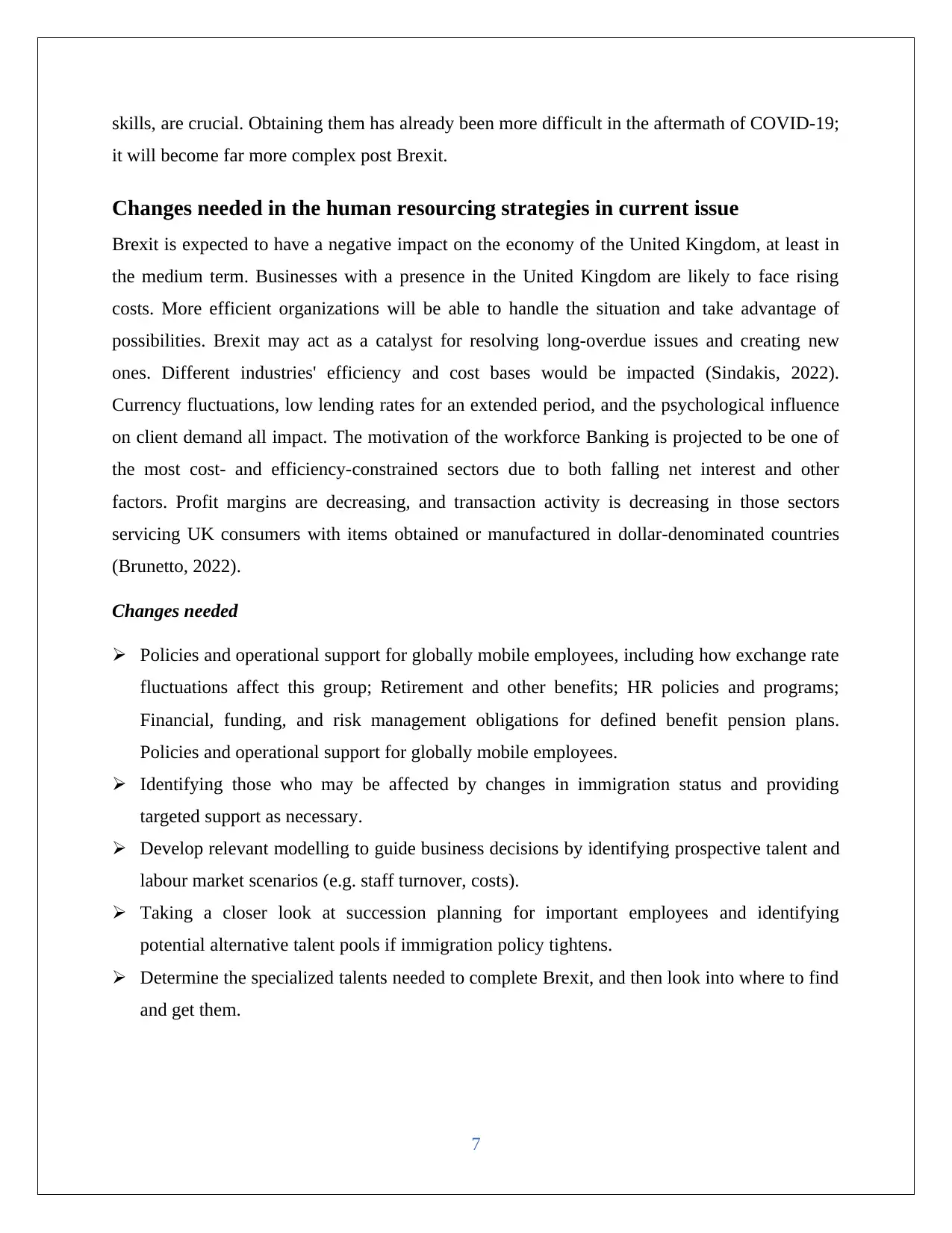
skills, are crucial. Obtaining them has already been more difficult in the aftermath of COVID-19;
it will become far more complex post Brexit.
Changes needed in the human resourcing strategies in current issue
Brexit is expected to have a negative impact on the economy of the United Kingdom, at least in
the medium term. Businesses with a presence in the United Kingdom are likely to face rising
costs. More efficient organizations will be able to handle the situation and take advantage of
possibilities. Brexit may act as a catalyst for resolving long-overdue issues and creating new
ones. Different industries' efficiency and cost bases would be impacted (Sindakis, 2022).
Currency fluctuations, low lending rates for an extended period, and the psychological influence
on client demand all impact. The motivation of the workforce Banking is projected to be one of
the most cost- and efficiency-constrained sectors due to both falling net interest and other
factors. Profit margins are decreasing, and transaction activity is decreasing in those sectors
servicing UK consumers with items obtained or manufactured in dollar-denominated countries
(Brunetto, 2022).
Changes needed
Policies and operational support for globally mobile employees, including how exchange rate
fluctuations affect this group; Retirement and other benefits; HR policies and programs;
Financial, funding, and risk management obligations for defined benefit pension plans.
Policies and operational support for globally mobile employees.
Identifying those who may be affected by changes in immigration status and providing
targeted support as necessary.
Develop relevant modelling to guide business decisions by identifying prospective talent and
labour market scenarios (e.g. staff turnover, costs).
Taking a closer look at succession planning for important employees and identifying
potential alternative talent pools if immigration policy tightens.
Determine the specialized talents needed to complete Brexit, and then look into where to find
and get them.
7
it will become far more complex post Brexit.
Changes needed in the human resourcing strategies in current issue
Brexit is expected to have a negative impact on the economy of the United Kingdom, at least in
the medium term. Businesses with a presence in the United Kingdom are likely to face rising
costs. More efficient organizations will be able to handle the situation and take advantage of
possibilities. Brexit may act as a catalyst for resolving long-overdue issues and creating new
ones. Different industries' efficiency and cost bases would be impacted (Sindakis, 2022).
Currency fluctuations, low lending rates for an extended period, and the psychological influence
on client demand all impact. The motivation of the workforce Banking is projected to be one of
the most cost- and efficiency-constrained sectors due to both falling net interest and other
factors. Profit margins are decreasing, and transaction activity is decreasing in those sectors
servicing UK consumers with items obtained or manufactured in dollar-denominated countries
(Brunetto, 2022).
Changes needed
Policies and operational support for globally mobile employees, including how exchange rate
fluctuations affect this group; Retirement and other benefits; HR policies and programs;
Financial, funding, and risk management obligations for defined benefit pension plans.
Policies and operational support for globally mobile employees.
Identifying those who may be affected by changes in immigration status and providing
targeted support as necessary.
Develop relevant modelling to guide business decisions by identifying prospective talent and
labour market scenarios (e.g. staff turnover, costs).
Taking a closer look at succession planning for important employees and identifying
potential alternative talent pools if immigration policy tightens.
Determine the specialized talents needed to complete Brexit, and then look into where to find
and get them.
7
Paraphrase This Document
Need a fresh take? Get an instant paraphrase of this document with our AI Paraphraser
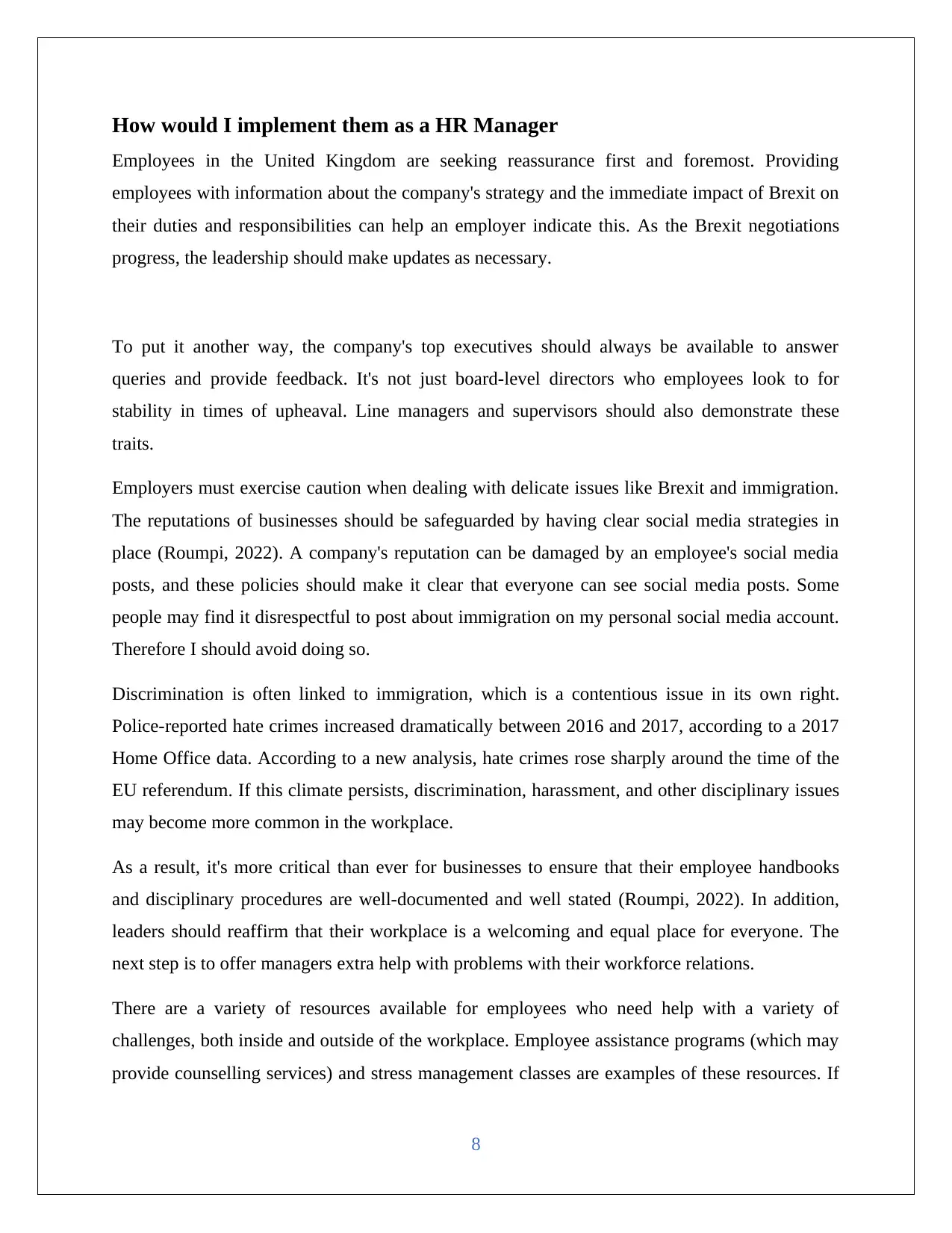
How would I implement them as a HR Manager
Employees in the United Kingdom are seeking reassurance first and foremost. Providing
employees with information about the company's strategy and the immediate impact of Brexit on
their duties and responsibilities can help an employer indicate this. As the Brexit negotiations
progress, the leadership should make updates as necessary.
To put it another way, the company's top executives should always be available to answer
queries and provide feedback. It's not just board-level directors who employees look to for
stability in times of upheaval. Line managers and supervisors should also demonstrate these
traits.
Employers must exercise caution when dealing with delicate issues like Brexit and immigration.
The reputations of businesses should be safeguarded by having clear social media strategies in
place (Roumpi, 2022). A company's reputation can be damaged by an employee's social media
posts, and these policies should make it clear that everyone can see social media posts. Some
people may find it disrespectful to post about immigration on my personal social media account.
Therefore I should avoid doing so.
Discrimination is often linked to immigration, which is a contentious issue in its own right.
Police-reported hate crimes increased dramatically between 2016 and 2017, according to a 2017
Home Office data. According to a new analysis, hate crimes rose sharply around the time of the
EU referendum. If this climate persists, discrimination, harassment, and other disciplinary issues
may become more common in the workplace.
As a result, it's more critical than ever for businesses to ensure that their employee handbooks
and disciplinary procedures are well-documented and well stated (Roumpi, 2022). In addition,
leaders should reaffirm that their workplace is a welcoming and equal place for everyone. The
next step is to offer managers extra help with problems with their workforce relations.
There are a variety of resources available for employees who need help with a variety of
challenges, both inside and outside of the workplace. Employee assistance programs (which may
provide counselling services) and stress management classes are examples of these resources. If
8
Employees in the United Kingdom are seeking reassurance first and foremost. Providing
employees with information about the company's strategy and the immediate impact of Brexit on
their duties and responsibilities can help an employer indicate this. As the Brexit negotiations
progress, the leadership should make updates as necessary.
To put it another way, the company's top executives should always be available to answer
queries and provide feedback. It's not just board-level directors who employees look to for
stability in times of upheaval. Line managers and supervisors should also demonstrate these
traits.
Employers must exercise caution when dealing with delicate issues like Brexit and immigration.
The reputations of businesses should be safeguarded by having clear social media strategies in
place (Roumpi, 2022). A company's reputation can be damaged by an employee's social media
posts, and these policies should make it clear that everyone can see social media posts. Some
people may find it disrespectful to post about immigration on my personal social media account.
Therefore I should avoid doing so.
Discrimination is often linked to immigration, which is a contentious issue in its own right.
Police-reported hate crimes increased dramatically between 2016 and 2017, according to a 2017
Home Office data. According to a new analysis, hate crimes rose sharply around the time of the
EU referendum. If this climate persists, discrimination, harassment, and other disciplinary issues
may become more common in the workplace.
As a result, it's more critical than ever for businesses to ensure that their employee handbooks
and disciplinary procedures are well-documented and well stated (Roumpi, 2022). In addition,
leaders should reaffirm that their workplace is a welcoming and equal place for everyone. The
next step is to offer managers extra help with problems with their workforce relations.
There are a variety of resources available for employees who need help with a variety of
challenges, both inside and outside of the workplace. Employee assistance programs (which may
provide counselling services) and stress management classes are examples of these resources. If
8
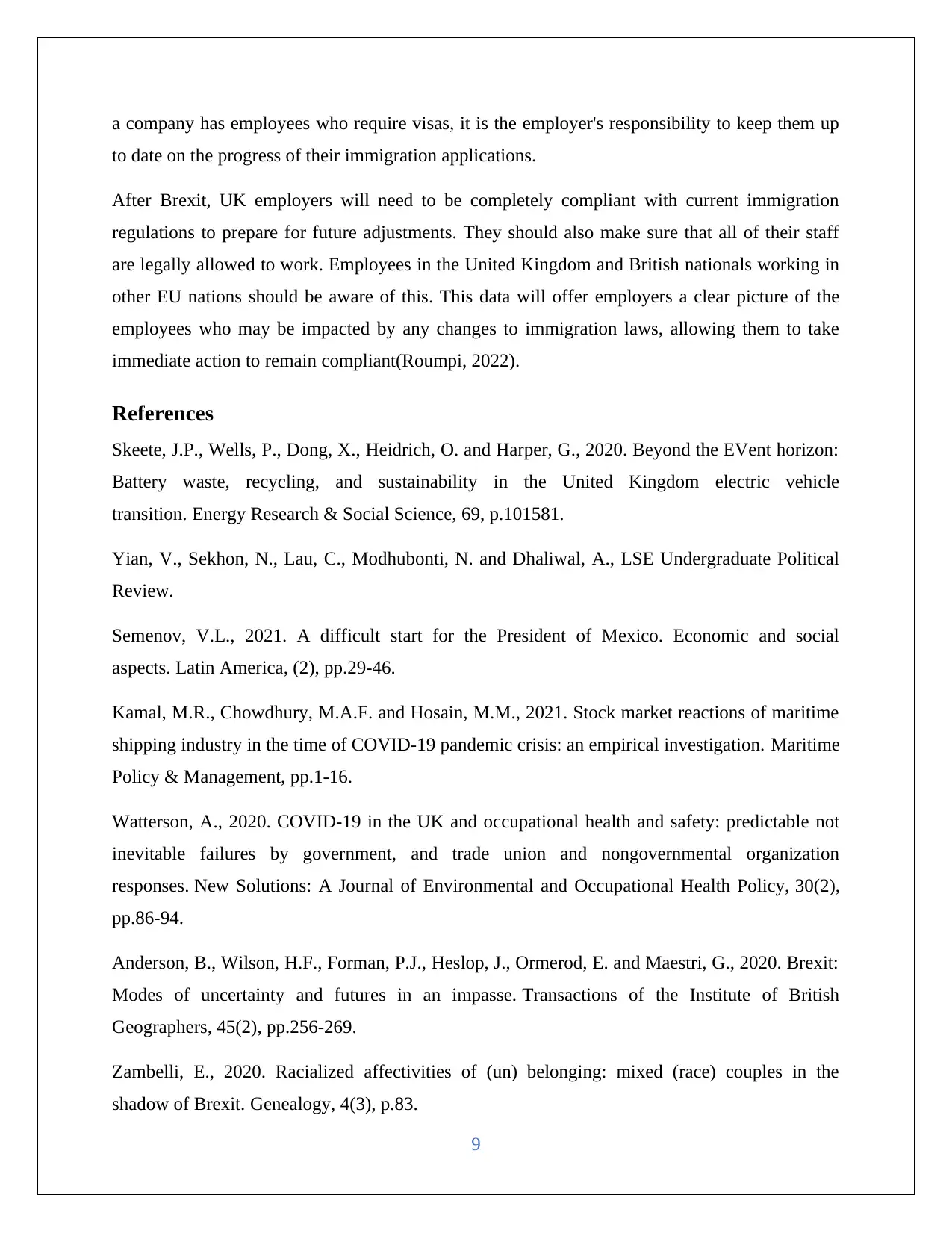
a company has employees who require visas, it is the employer's responsibility to keep them up
to date on the progress of their immigration applications.
After Brexit, UK employers will need to be completely compliant with current immigration
regulations to prepare for future adjustments. They should also make sure that all of their staff
are legally allowed to work. Employees in the United Kingdom and British nationals working in
other EU nations should be aware of this. This data will offer employers a clear picture of the
employees who may be impacted by any changes to immigration laws, allowing them to take
immediate action to remain compliant(Roumpi, 2022).
References
Skeete, J.P., Wells, P., Dong, X., Heidrich, O. and Harper, G., 2020. Beyond the EVent horizon:
Battery waste, recycling, and sustainability in the United Kingdom electric vehicle
transition. Energy Research & Social Science, 69, p.101581.
Yian, V., Sekhon, N., Lau, C., Modhubonti, N. and Dhaliwal, A., LSE Undergraduate Political
Review.
Semenov, V.L., 2021. A difficult start for the President of Mexico. Economic and social
aspects. Latin America, (2), pp.29-46.
Kamal, M.R., Chowdhury, M.A.F. and Hosain, M.M., 2021. Stock market reactions of maritime
shipping industry in the time of COVID-19 pandemic crisis: an empirical investigation. Maritime
Policy & Management, pp.1-16.
Watterson, A., 2020. COVID-19 in the UK and occupational health and safety: predictable not
inevitable failures by government, and trade union and nongovernmental organization
responses. New Solutions: A Journal of Environmental and Occupational Health Policy, 30(2),
pp.86-94.
Anderson, B., Wilson, H.F., Forman, P.J., Heslop, J., Ormerod, E. and Maestri, G., 2020. Brexit:
Modes of uncertainty and futures in an impasse. Transactions of the Institute of British
Geographers, 45(2), pp.256-269.
Zambelli, E., 2020. Racialized affectivities of (un) belonging: mixed (race) couples in the
shadow of Brexit. Genealogy, 4(3), p.83.
9
to date on the progress of their immigration applications.
After Brexit, UK employers will need to be completely compliant with current immigration
regulations to prepare for future adjustments. They should also make sure that all of their staff
are legally allowed to work. Employees in the United Kingdom and British nationals working in
other EU nations should be aware of this. This data will offer employers a clear picture of the
employees who may be impacted by any changes to immigration laws, allowing them to take
immediate action to remain compliant(Roumpi, 2022).
References
Skeete, J.P., Wells, P., Dong, X., Heidrich, O. and Harper, G., 2020. Beyond the EVent horizon:
Battery waste, recycling, and sustainability in the United Kingdom electric vehicle
transition. Energy Research & Social Science, 69, p.101581.
Yian, V., Sekhon, N., Lau, C., Modhubonti, N. and Dhaliwal, A., LSE Undergraduate Political
Review.
Semenov, V.L., 2021. A difficult start for the President of Mexico. Economic and social
aspects. Latin America, (2), pp.29-46.
Kamal, M.R., Chowdhury, M.A.F. and Hosain, M.M., 2021. Stock market reactions of maritime
shipping industry in the time of COVID-19 pandemic crisis: an empirical investigation. Maritime
Policy & Management, pp.1-16.
Watterson, A., 2020. COVID-19 in the UK and occupational health and safety: predictable not
inevitable failures by government, and trade union and nongovernmental organization
responses. New Solutions: A Journal of Environmental and Occupational Health Policy, 30(2),
pp.86-94.
Anderson, B., Wilson, H.F., Forman, P.J., Heslop, J., Ormerod, E. and Maestri, G., 2020. Brexit:
Modes of uncertainty and futures in an impasse. Transactions of the Institute of British
Geographers, 45(2), pp.256-269.
Zambelli, E., 2020. Racialized affectivities of (un) belonging: mixed (race) couples in the
shadow of Brexit. Genealogy, 4(3), p.83.
9
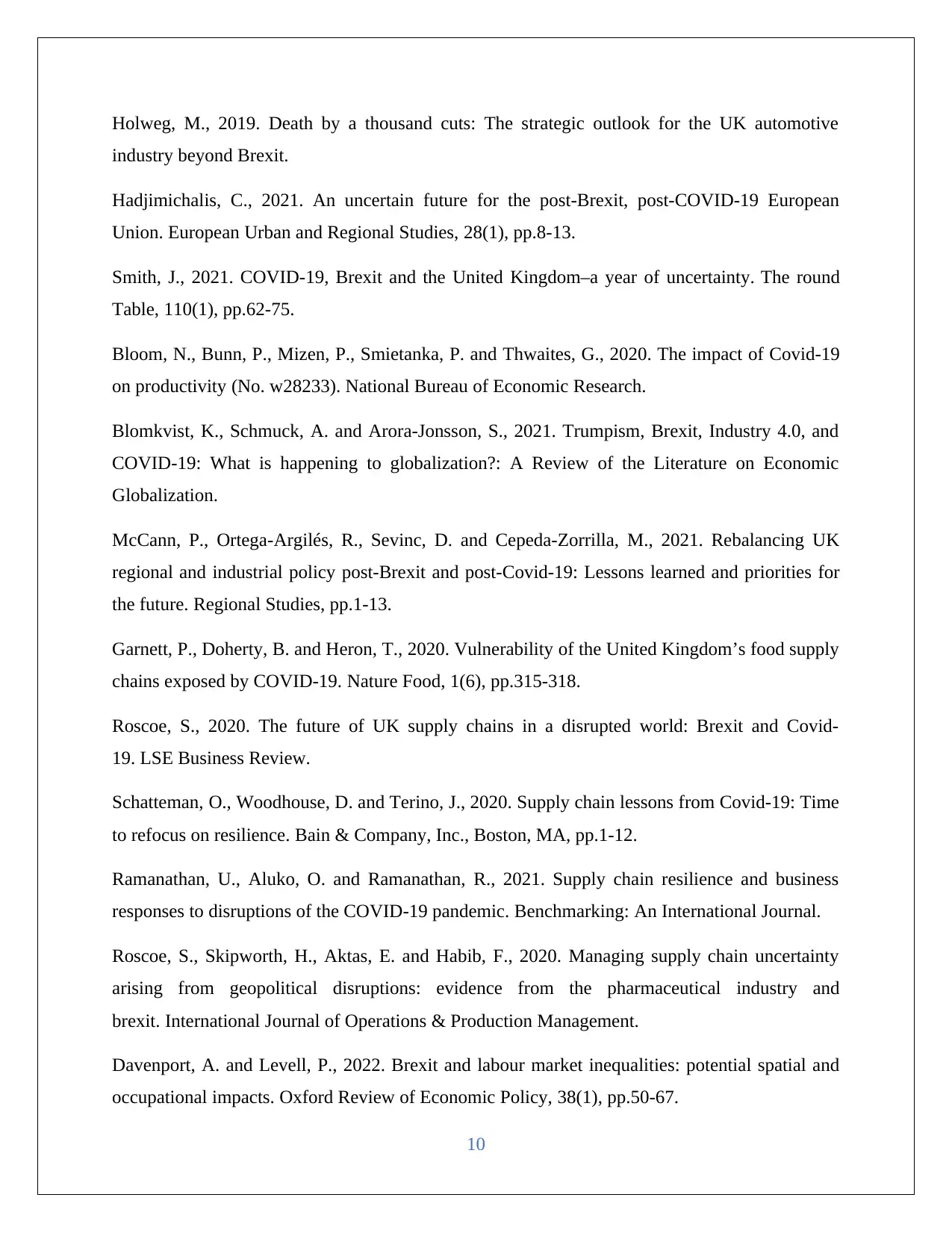
Holweg, M., 2019. Death by a thousand cuts: The strategic outlook for the UK automotive
industry beyond Brexit.
Hadjimichalis, C., 2021. An uncertain future for the post-Brexit, post-COVID-19 European
Union. European Urban and Regional Studies, 28(1), pp.8-13.
Smith, J., 2021. COVID-19, Brexit and the United Kingdom–a year of uncertainty. The round
Table, 110(1), pp.62-75.
Bloom, N., Bunn, P., Mizen, P., Smietanka, P. and Thwaites, G., 2020. The impact of Covid-19
on productivity (No. w28233). National Bureau of Economic Research.
Blomkvist, K., Schmuck, A. and Arora-Jonsson, S., 2021. Trumpism, Brexit, Industry 4.0, and
COVID-19: What is happening to globalization?: A Review of the Literature on Economic
Globalization.
McCann, P., Ortega-Argilés, R., Sevinc, D. and Cepeda-Zorrilla, M., 2021. Rebalancing UK
regional and industrial policy post-Brexit and post-Covid-19: Lessons learned and priorities for
the future. Regional Studies, pp.1-13.
Garnett, P., Doherty, B. and Heron, T., 2020. Vulnerability of the United Kingdom’s food supply
chains exposed by COVID-19. Nature Food, 1(6), pp.315-318.
Roscoe, S., 2020. The future of UK supply chains in a disrupted world: Brexit and Covid-
19. LSE Business Review.
Schatteman, O., Woodhouse, D. and Terino, J., 2020. Supply chain lessons from Covid-19: Time
to refocus on resilience. Bain & Company, Inc., Boston, MA, pp.1-12.
Ramanathan, U., Aluko, O. and Ramanathan, R., 2021. Supply chain resilience and business
responses to disruptions of the COVID-19 pandemic. Benchmarking: An International Journal.
Roscoe, S., Skipworth, H., Aktas, E. and Habib, F., 2020. Managing supply chain uncertainty
arising from geopolitical disruptions: evidence from the pharmaceutical industry and
brexit. International Journal of Operations & Production Management.
Davenport, A. and Levell, P., 2022. Brexit and labour market inequalities: potential spatial and
occupational impacts. Oxford Review of Economic Policy, 38(1), pp.50-67.
10
industry beyond Brexit.
Hadjimichalis, C., 2021. An uncertain future for the post-Brexit, post-COVID-19 European
Union. European Urban and Regional Studies, 28(1), pp.8-13.
Smith, J., 2021. COVID-19, Brexit and the United Kingdom–a year of uncertainty. The round
Table, 110(1), pp.62-75.
Bloom, N., Bunn, P., Mizen, P., Smietanka, P. and Thwaites, G., 2020. The impact of Covid-19
on productivity (No. w28233). National Bureau of Economic Research.
Blomkvist, K., Schmuck, A. and Arora-Jonsson, S., 2021. Trumpism, Brexit, Industry 4.0, and
COVID-19: What is happening to globalization?: A Review of the Literature on Economic
Globalization.
McCann, P., Ortega-Argilés, R., Sevinc, D. and Cepeda-Zorrilla, M., 2021. Rebalancing UK
regional and industrial policy post-Brexit and post-Covid-19: Lessons learned and priorities for
the future. Regional Studies, pp.1-13.
Garnett, P., Doherty, B. and Heron, T., 2020. Vulnerability of the United Kingdom’s food supply
chains exposed by COVID-19. Nature Food, 1(6), pp.315-318.
Roscoe, S., 2020. The future of UK supply chains in a disrupted world: Brexit and Covid-
19. LSE Business Review.
Schatteman, O., Woodhouse, D. and Terino, J., 2020. Supply chain lessons from Covid-19: Time
to refocus on resilience. Bain & Company, Inc., Boston, MA, pp.1-12.
Ramanathan, U., Aluko, O. and Ramanathan, R., 2021. Supply chain resilience and business
responses to disruptions of the COVID-19 pandemic. Benchmarking: An International Journal.
Roscoe, S., Skipworth, H., Aktas, E. and Habib, F., 2020. Managing supply chain uncertainty
arising from geopolitical disruptions: evidence from the pharmaceutical industry and
brexit. International Journal of Operations & Production Management.
Davenport, A. and Levell, P., 2022. Brexit and labour market inequalities: potential spatial and
occupational impacts. Oxford Review of Economic Policy, 38(1), pp.50-67.
10
Secure Best Marks with AI Grader
Need help grading? Try our AI Grader for instant feedback on your assignments.
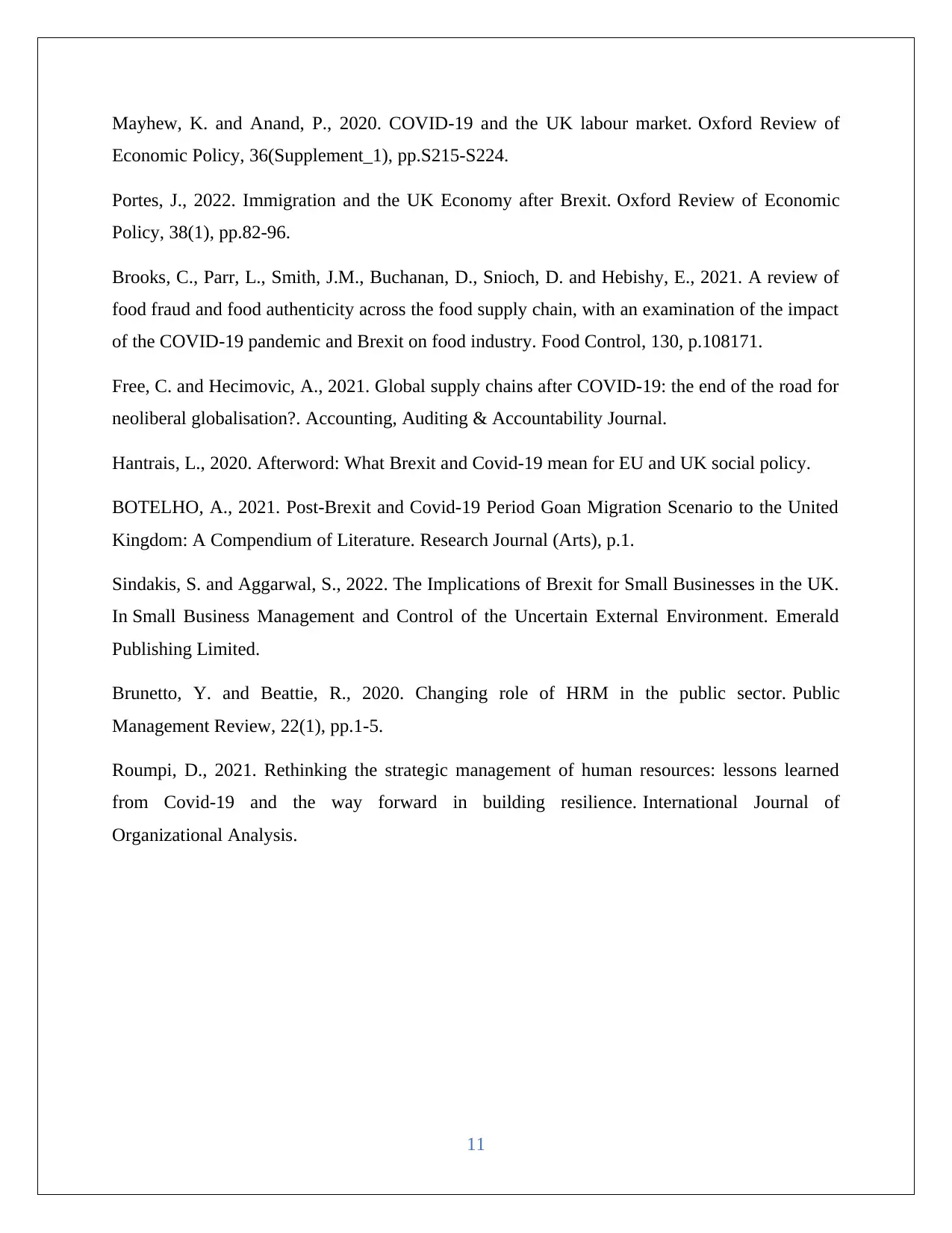
Mayhew, K. and Anand, P., 2020. COVID-19 and the UK labour market. Oxford Review of
Economic Policy, 36(Supplement_1), pp.S215-S224.
Portes, J., 2022. Immigration and the UK Economy after Brexit. Oxford Review of Economic
Policy, 38(1), pp.82-96.
Brooks, C., Parr, L., Smith, J.M., Buchanan, D., Snioch, D. and Hebishy, E., 2021. A review of
food fraud and food authenticity across the food supply chain, with an examination of the impact
of the COVID-19 pandemic and Brexit on food industry. Food Control, 130, p.108171.
Free, C. and Hecimovic, A., 2021. Global supply chains after COVID-19: the end of the road for
neoliberal globalisation?. Accounting, Auditing & Accountability Journal.
Hantrais, L., 2020. Afterword: What Brexit and Covid-19 mean for EU and UK social policy.
BOTELHO, A., 2021. Post-Brexit and Covid-19 Period Goan Migration Scenario to the United
Kingdom: A Compendium of Literature. Research Journal (Arts), p.1.
Sindakis, S. and Aggarwal, S., 2022. The Implications of Brexit for Small Businesses in the UK.
In Small Business Management and Control of the Uncertain External Environment. Emerald
Publishing Limited.
Brunetto, Y. and Beattie, R., 2020. Changing role of HRM in the public sector. Public
Management Review, 22(1), pp.1-5.
Roumpi, D., 2021. Rethinking the strategic management of human resources: lessons learned
from Covid-19 and the way forward in building resilience. International Journal of
Organizational Analysis.
11
Economic Policy, 36(Supplement_1), pp.S215-S224.
Portes, J., 2022. Immigration and the UK Economy after Brexit. Oxford Review of Economic
Policy, 38(1), pp.82-96.
Brooks, C., Parr, L., Smith, J.M., Buchanan, D., Snioch, D. and Hebishy, E., 2021. A review of
food fraud and food authenticity across the food supply chain, with an examination of the impact
of the COVID-19 pandemic and Brexit on food industry. Food Control, 130, p.108171.
Free, C. and Hecimovic, A., 2021. Global supply chains after COVID-19: the end of the road for
neoliberal globalisation?. Accounting, Auditing & Accountability Journal.
Hantrais, L., 2020. Afterword: What Brexit and Covid-19 mean for EU and UK social policy.
BOTELHO, A., 2021. Post-Brexit and Covid-19 Period Goan Migration Scenario to the United
Kingdom: A Compendium of Literature. Research Journal (Arts), p.1.
Sindakis, S. and Aggarwal, S., 2022. The Implications of Brexit for Small Businesses in the UK.
In Small Business Management and Control of the Uncertain External Environment. Emerald
Publishing Limited.
Brunetto, Y. and Beattie, R., 2020. Changing role of HRM in the public sector. Public
Management Review, 22(1), pp.1-5.
Roumpi, D., 2021. Rethinking the strategic management of human resources: lessons learned
from Covid-19 and the way forward in building resilience. International Journal of
Organizational Analysis.
11

12
1 out of 12
Related Documents
Your All-in-One AI-Powered Toolkit for Academic Success.
+13062052269
info@desklib.com
Available 24*7 on WhatsApp / Email
![[object Object]](/_next/static/media/star-bottom.7253800d.svg)
Unlock your academic potential
© 2024 | Zucol Services PVT LTD | All rights reserved.




